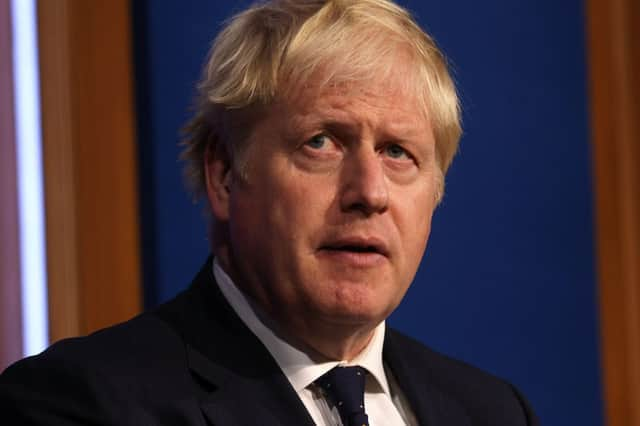Boris Johnson to give update on lifting Covid Plan B rules today


Boris Johnson will update MPs on Covid-19 restrictions in England today and is expected to confirm an easing of Plan B rules.
The Prime Minister and his Cabinet will assess the latest coronavirus data on Wednesday (19 January) morning before making a statement in the Commons this afternoon.
When will Plan B end?
Advertisement
Hide AdAdvertisement
Hide AdThe Plan B restrictions introduced last month to tackle the spread of the Omicron variant, including the use of Covid passes, mandatory mask wearing in most indoor places, and work from home guidance, are due to expire on 26 January.
It is expected that face coverings could still be required beyond next week, but the other restrictions are likely to be scrapped.
Health Secretary Sajid Javid told MPs on Tuesday (18 January) that he was “cautiously optimistic” that the remaining restrictions will be able to be “substantially” reduced next week, after saying the UK is winning the war on Omicron.
He said: “I have always said that these restrictions should not stay in place a day longer than absolutely necessary.
Advertisement
Hide AdAdvertisement
Hide Ad"Due to . . . the likelihood that we have already reached the peak of the case numbers of hospitalisations, I am cautiously optimistic that we will be able to substantially reduce restrictions next week.”
No final decisions on lifting the rules have yet been made, but any attempt to extend Plan B beyond the cut-off date could trigger a fresh confrontation with Tory MPs, something the Prime Minister will want to avoid as his leadership has already been weakened due to the recent row over Downing Street parties.
Asked whether restrictions would be lifted during a visit to a hospital on Tuesday, Mr Johnson said: “We’ve got to be careful about Covid. We’ve got to continue to remember that it’s a threat.”
‘Latest data is encouraging’
Latest government figures show that a total of 19,450 people were in hospital in the UK with Covid-19 as of 17 January.
Advertisement
Hide AdAdvertisement
Hide AdThis is down 2% week-on-week, although the total has risen slightly in the most recent two days.
A further 94,432 lab-confirmed Covid-19 cases have been recorded in the UK as of 9am on Tuesday, while a further 438 people were reported to have died within 28 days of testing positive for Covid-19, bringing the total to 152,513.
The Plan B measures were put in place to combat the surge in Covid-19 cases at the end of last year, driven by the Omicron variant, with the aim of buying time to offer more booster jabs.
Reports have suggested the government may now choose to lift the most economically significant measures – working from home and Covid passes – while keeping the requirement to wear face masks.
Advertisement
Hide AdAdvertisement
Hide AdA government spokesman said: “Decisions on the next steps remain finely balanced.
“Plan B was implemented in December to slow the rapid spread of the extremely transmissible Omicron variant, and get more jabs in arms.
“It’s thanks to the phenomenal efforts of the NHS and many dedicated volunteers that we have now delivered over 36 million boosters to people across the UK.
“The Omicron variant continues to pose a significant threat and the pandemic is not over.
Advertisement
Hide AdAdvertisement
Hide Ad“Infections remain high but the latest data is encouraging, with cases beginning to fall. Vaccines remain our best line of defence and we urge people to come forward, to give themselves the best possible protection.”
On Tuesday, Scottish First Minister Nicola Sturgeon confirmed that restrictions put in place to curb the spread of the Omicron variant in Scotland will be eased from Monday (24 January).
This means nightclub closures and the requirement for table service in hospitality will come to an end, while attendance limits on indoor events and the three-household limit on indoor gatherings will be lifted.
However, some baseline coronavirus measures which were in place before the Omicron wave will still remain, including wearing face coverings in public indoor settings and on public transport, as well as working from home where possible.